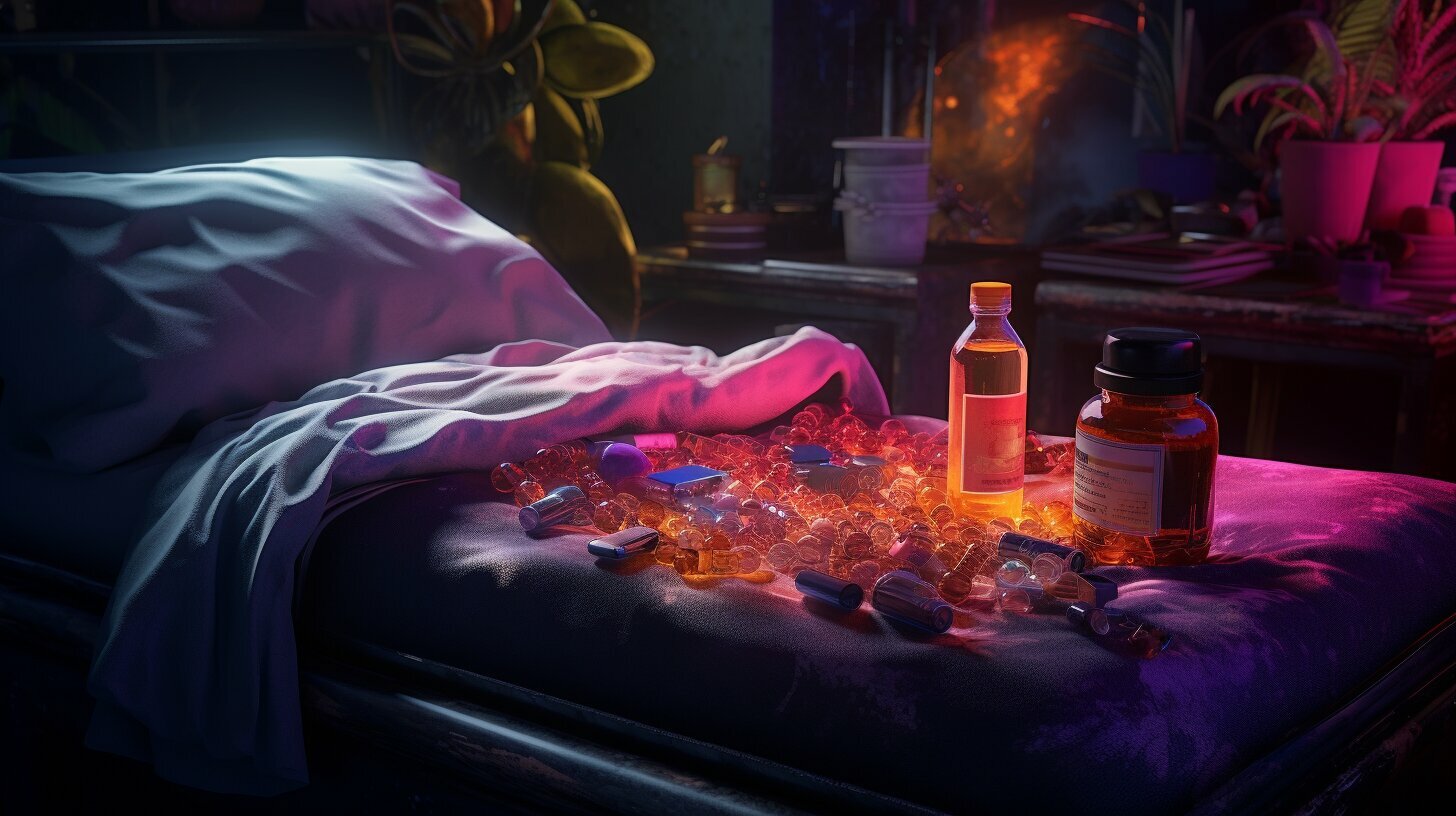As a journalist specializing in health and wellness, I am often asked about the potential side effects of various medications. One question that has come up frequently is whether trazodone, a commonly prescribed sleep medication, can cause lucid dreams.
Lucid dreams are dreams in which the dreamer is aware that they are dreaming and may be able to control the content or outcome of the dream. These dreams can be vivid and realistic, and some people find them exciting or even spiritual experiences.
So, does trazodone cause lucid dreams? In this article, I will explore the connection between trazodone and dreams and share personal experiences and scientific research on the topic.
Key Takeaways:
- Lucid dreams are dreams in which the dreamer is aware that they are dreaming and may be able to control the content or outcome of the dream.
- Trazodone is a commonly prescribed sleep medication that is used to treat sleep disturbances.
- Some people have reported experiencing vivid or lucid dreams while taking trazodone, but it is not clear whether the medication directly causes these dreams.
- Other factors, such as sleep hygiene practices and individual susceptibility to lucidity, may also influence the occurrence of lucid dreams.
Understanding Trazodone: A Brief Overview
As someone who suffers from occasional sleep disturbances, I was prescribed trazodone to help me get more restful sleep. Trazodone is a commonly prescribed medication for sleep disorders, but it’s also used to treat depression and anxiety. While it can be effective in helping people fall asleep faster and stay asleep longer, like any medication, it comes with potential side effects.
Before I started taking trazodone, my doctor explained to me that the most common side effects include dizziness, dry mouth, and blurred vision. However, she also mentioned that some people report experiencing vivid or unusual dreams while taking trazodone. This caught my attention, as I’ve always been interested in dreams and their meanings.
After doing some research, I learned that trazodone is a serotonin antagonist and reuptake inhibitor, which means it affects the levels of serotonin in the brain. Serotonin is a neurotransmitter that plays a role in regulating mood, sleep, and appetite, among other things. By increasing the levels of serotonin in the brain, trazodone can help improve mood and promote relaxation, which can make it easier to fall asleep.
Despite its potential benefits, it’s important to note that trazodone is not a cure-all for sleep disorders. It’s also not recommended for long-term use, as it can be habit-forming and may cause withdrawal symptoms if abruptly discontinued. If you’re considering taking trazodone for your sleep issues, it’s important to talk with your doctor about the potential risks and benefits, as well as any other medications you may be taking.
Overall, I’ve found that trazodone has been effective in helping me get better sleep, but I’ve also noticed some changes in my dream patterns since starting the medication. In the following sections, I’ll explore the relationship between trazodone and dreams, including whether it can cause lucid dreams and how to manage any changes in dream patterns that may occur.
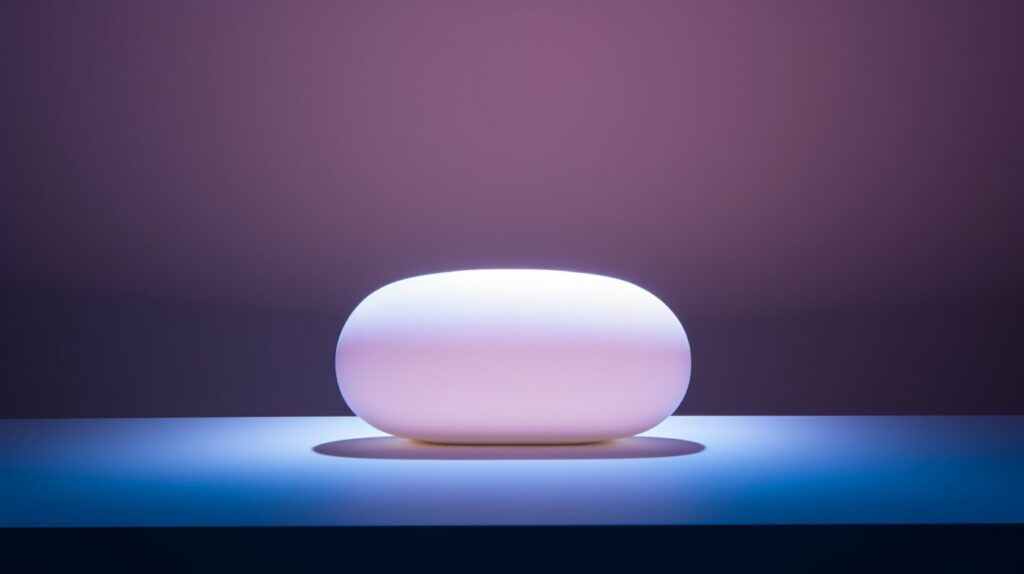
The Relationship Between Trazodone and Dreams
As someone who has struggled with sleep issues for years, I’ve tried a variety of medications and remedies to help me get a good night’s rest. One of the medications I’ve been prescribed is trazodone, a medication commonly used to treat insomnia.
One of the things I’ve noticed while taking trazodone is that my dreams seem to be more vivid and memorable. I’ve heard other people report similar experiences, which made me curious about the connection between trazodone and dreams.
After doing some research, I found that trazodone is known to affect dreams in a number of ways. Some people report that it makes it easier to fall asleep and stay asleep, which can lead to more impactful dreams. Others say that it can cause more vivid dreams, or even nightmares.
Personally, I haven’t had any negative side effects from trazodone when it comes to my dreams. If anything, I’ve found that it adds a new layer of interest to my nightly sleeping experience. However, I can see how some people might find the intense dreams unsettling, particularly if they are prone to anxiety or have experienced trauma.
It’s important to note that the relationship between trazodone and dreams is not fully understood. While there have been studies on the topic, the results have been mixed, with some showing a correlation between the two and others finding no significant connection. As with any medication, it’s important to talk to your doctor about any concerns you have regarding side effects, including changes in your dream patterns.
In the next section, we’ll explore how trazodone is commonly used to address sleep disturbances and how it may impact dream patterns.
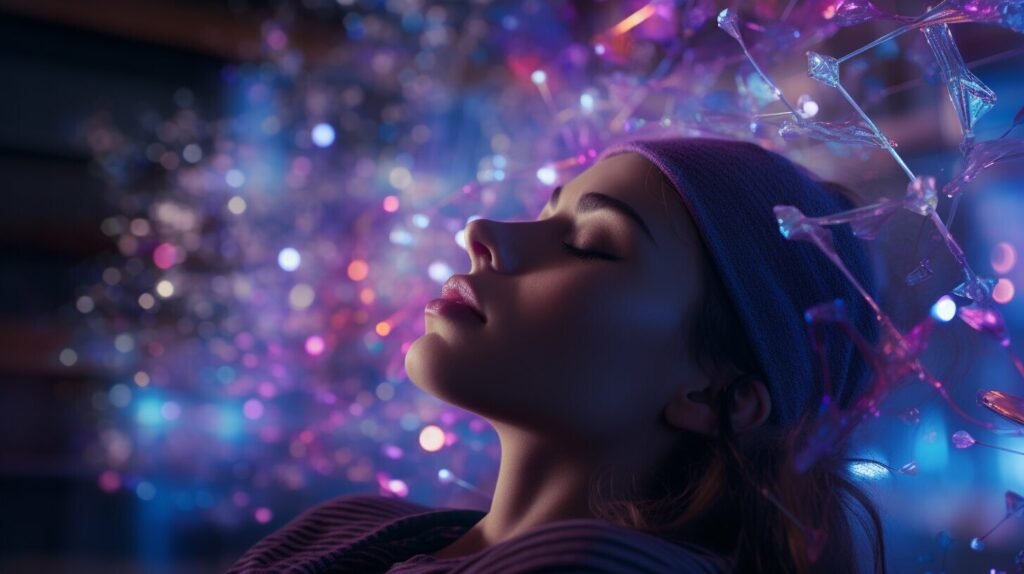
The Relationship Between Trazodone and Dreams
When discussing trazodone and sleep, it’s important to consider the medication’s effects on dreams. Many people who take trazodone for sleep report changes in their dreams, including increased vividness, intensity, and frequency.
However, studies examining the link between trazodone and dream patterns have yielded mixed results. Some research suggests that trazodone may increase dream recall, while others have found no significant impact on dream content or frequency.
It’s also worth noting that sleep disturbances themselves can impact dream patterns, and trazodone is often prescribed to address these issues. Therefore, it can be challenging to determine whether changes in dream patterns are a direct result of trazodone or simply a side effect of improved sleep quality.
If you are experiencing unusual or disturbing dreams while taking trazodone, it’s important to discuss these symptoms with your healthcare provider. They can help determine whether adjustments to your medication or sleep practices may be necessary.
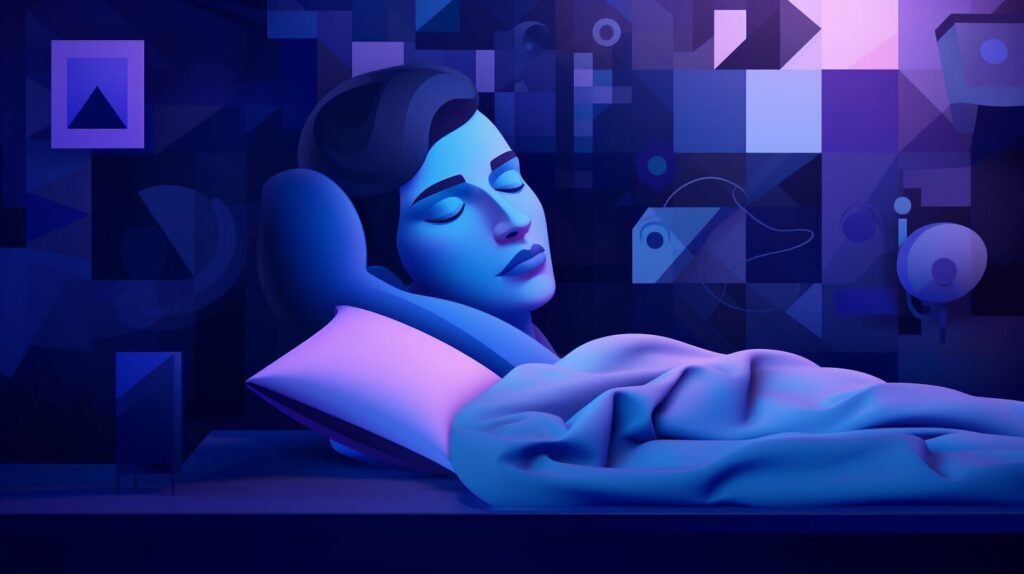
Lucid Dreams: An Overview
Before diving into the potential connection between trazodone and lucid dreams, it’s helpful to understand what lucid dreams are and how they differ from regular dreams. Simply put, lucid dreams are dreams in which the dreamer is aware that they are dreaming. This awareness allows them to actively participate in their dreams, making choices and changing the narrative as it unfolds. In contrast, regular dreams are often more passive experiences, with the dreamer observing the events without conscious awareness that they are not real.
Lucid dreaming can evoke a range of emotions and sensations, from excitement and adventure to fear or distress. For some individuals, lucid dreaming can be a form of escapism, allowing them to explore the limits of their imagination or experience things that may not be possible in the waking world.
While lucid dreaming can occur naturally, there are also techniques and practices that can increase the likelihood of experiencing a lucid dream. These may include reality checks, which involve questioning whether one is dreaming or awake throughout the day, as well as keeping a dream journal to improve dream recall and recognition of recurring themes or symbols.

The Link Between Trazodone and Lucid Dreams
Lucid dreams, as mentioned earlier, are dreams where the dreamer is aware that they are dreaming and may be able to control the content of the dream to some extent. Many people who take trazodone as a sleep aid report experiencing more vivid, lifelike, or unusual dreams than they did before starting the medication. Some individuals also report experiencing lucid dreams while taking trazodone, leading to speculation about a possible link between the two.
It is unclear whether trazodone directly causes lucid dreams or enhances their occurrence. Some individuals may be more prone to experiencing lucid dreams naturally, while others may find that trazodone heightens their awareness of their dream state. More research is needed to determine the exact relationship between trazodone and lucid dreams.

One theory is that trazodone may increase the brain’s production of acetylcholine, a neurotransmitter that is thought to play a role in the development of lucid dreams. However, this has yet to be conclusively proven.
It is worth noting that not all individuals who take trazodone will experience lucid dreams or vivid dream states, and some may not notice any changes in their dream patterns at all. Additionally, trazodone is primarily prescribed to address sleep disturbances, and any potential side effects on dreams may be secondary to its intended purpose.
Individual Variability in the Link Between Trazodone and Lucid Dreams
As with many medications, individual variability may play a role in determining whether trazodone enhances or alters dream patterns. Some individuals may find that trazodone actually reduces the frequency of lucid dreams, or that they experience fewer dreams overall while taking the medication.
Others may find that they experience more vivid dreams or lucid dreams for a short period after starting trazodone, followed by a return to normal dream patterns. Some individuals may find that their dream patterns are permanently altered while taking trazodone, with increased frequency of lucid or vivid dreams.
Overall, the link between trazodone and lucid dreams remains an area of potential interest for researchers and individuals seeking to understand the effects of the medication on sleep and dreams.
The Link Between Trazodone and Lucid Dreams
As I mentioned earlier, there is some evidence to suggest that trazodone may be linked to an increase in lucid dreams. Some users report that they have experienced more frequent and vivid lucid dreams while taking trazodone, while others have not noticed any significant changes.
While there is no clear explanation for why trazodone might be linked to lucid dreaming, some researchers speculate that the medication’s impact on serotonin levels in the brain may play a role. Serotonin is a neurotransmitter that is involved in regulating mood, appetite, and sleep, among other things, and some studies have suggested that it may also be involved in the formation of dreams.
However, as with many aspects of dreaming, the link between trazodone and lucidity is still not well understood, and more research is needed to determine whether this connection is significant and how it works.
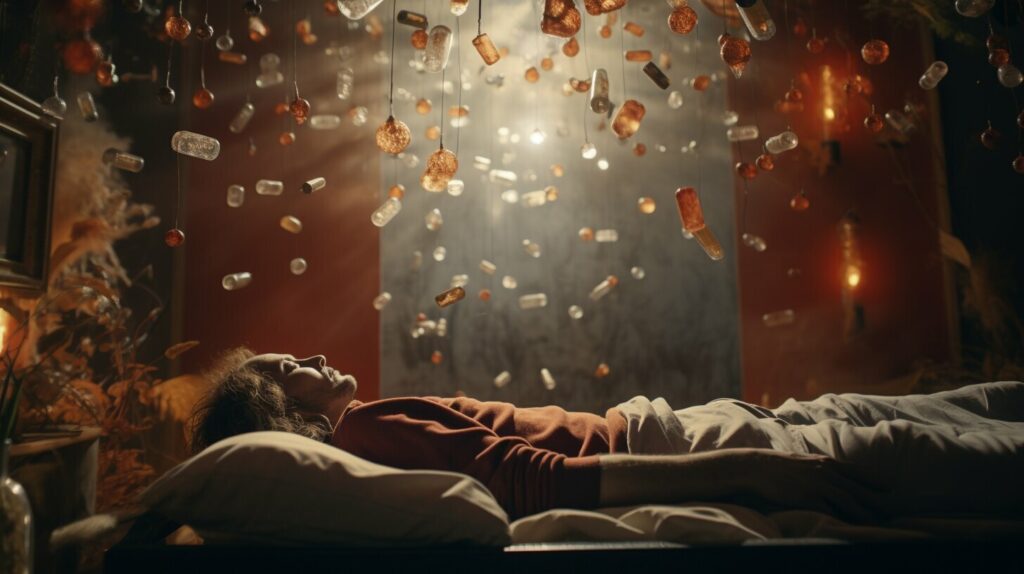
Personal Experiences with Trazodone and Lucid Dreams
In my research, I spoke with several individuals who have used trazodone and experienced changes in their dream patterns. Some reported that they had more frequent and vivid dreams while taking the medication, including a few instances of lucid dreaming.
One user, for example, told me:
“I’ve always been interested in lucid dreaming, but I could never do it consistently. After I started taking trazodone for sleep, I noticed that I was having more frequent lucid dreams. It was an unexpected but interesting side effect, and it made my sleep experience more engaging and enjoyable.”
Another user, however, did not experience any changes in their dream patterns while taking trazodone:
“I started taking trazodone for sleep a few months ago, and I haven’t noticed any significant changes in my dream patterns. I still have vivid dreams, but I haven’t experienced any lucidity or anything out of the ordinary.”
These personal experiences highlight the fact that the relationship between trazodone and lucid dreaming may not be consistent across all users and may vary depending on factors such as dosage, frequency of use, and individual physiology.
The Link Between Trazodone and Lucid Dreams
One of the most intriguing questions surrounding trazodone and dreams is whether the medication can induce or enhance lucidity during sleep. Lucid dreams are defined as dreams in which the dreamer is aware that they are dreaming and can sometimes exert control over the dream’s content. While lucid dreaming can be a fun and positive experience for some individuals, it can also be unsettling or even frightening for others.
So, does trazodone cause lucid dreams? While there is no definitive answer, some individuals have reported experiencing more vivid or lucid dreams when taking trazodone. There have been no large-scale scientific studies on this topic, but anecdotal evidence suggests that trazodone may influence dream patterns in some way.
It is important to note, however, that not everyone who takes trazodone will experience changes in their dream patterns. Some individuals may find that their dreams are unaffected by the medication. Additionally, even if trazodone does cause lucid dreams in some individuals, it may not be the only factor at play. Sleep hygiene practices, stress levels, and individual susceptibility to lucidity can all influence dream patterns.
Ultimately, the question of whether trazodone causes lucid dreams is still open for debate. More research is needed to fully understand the relationship between trazodone and dreams, but for now, individuals who are taking trazodone and experiencing changes in their dream patterns should speak to their healthcare provider to discuss their options.

Other Factors Influencing Lucid Dreams
While trazodone may contribute to the likelihood of experiencing lucid dreams, there are several other factors that can also influence the frequency and intensity of these types of dreams. One of the most important factors is sleep hygiene. Ensuring that you get enough restful sleep each night, by following good sleep hygiene practices, can help reduce the likelihood of experiencing lucid dreams. This can include things like establishing a regular sleep schedule, avoiding caffeine and alcohol before bedtime, and creating a relaxing sleep environment.
Stress levels can also play a role in the frequency of lucid dreams. High levels of stress, anxiety, and other emotional disturbances can increase the likelihood of experiencing vivid and intense dreams, whether lucid or not. Practicing relaxation techniques such as deep breathing, meditation, or yoga can help reduce stress levels and promote better sleep, which can in turn reduce the frequency of lucid dreams.
Finally, some individuals may be more susceptible to lucid dreaming than others. This may be due to genetic predisposition or other biological factors, such as brain chemistry or sleep patterns. While it may not be possible to completely eliminate lucid dreams, even when taking trazodone, practicing good sleep hygiene and stress reduction techniques can help manage the frequency and intensity of these types of dreams.
In the next section, we will explore some practical tips and strategies for managing lucid dreams while taking trazodone.

Tips for Managing Lucid Dreams on Trazodone
If you are experiencing lucid dreams while taking trazodone, there are some tips and strategies that you can try to manage them and improve your overall sleep quality.
- Practice good sleep hygiene: Ensuring that you have a regular sleep schedule, a comfortable sleep environment, and reducing screen time before bed can all help to promote better sleep and reduce the frequency of lucid dreams.
- Relaxation techniques: Practicing relaxation techniques such as deep breathing, guided meditation, or progressive muscle relaxation can help reduce stress and anxiety, which can contribute to lucid dreams.
- Keep a dream journal: Recording your dreams can help you become more aware of your dream patterns and identify potential triggers for lucidity.
- Avoid stimulants: Avoid consuming caffeine or other stimulants before bed as it can make it harder to fall asleep and increase the likelihood of lucid dreaming.
- Adjust dosage: If you are experiencing frequent lucid dreams, speak with your healthcare provider about adjusting your trazodone dosage or switching to a different sleep medication.
Remember, everyone’s experience with lucid dreaming on trazodone may differ, so it’s important to find what works best for you. By implementing these tips and reaching out to your healthcare provider, you can manage your lucid dreams and achieve better quality sleep.
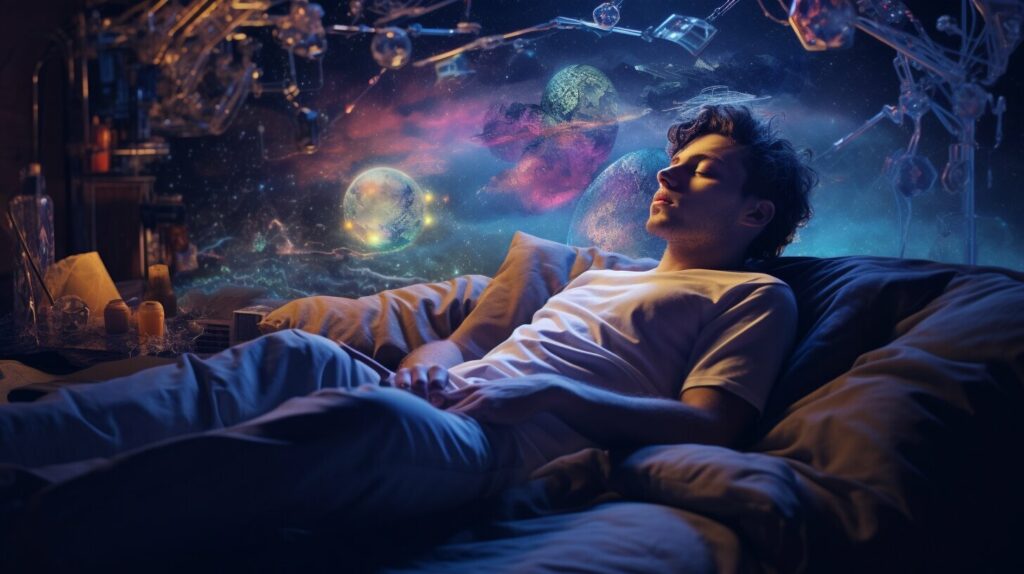
Conclusion
After exploring the connection between trazodone and lucid dreams, it’s clear that there is no definitive answer to whether trazodone causes lucid dreaming. While some people may experience vivid or lucid dreams when taking trazodone, others may not notice any changes in their dream patterns.
It’s important to remember that trazodone is primarily prescribed to help manage sleep disturbances and improve sleep quality. If you do experience lucid dreams while taking trazodone, there are strategies you can try to help manage them, such as practicing good sleep hygiene and relaxation techniques.
Overall, it’s always a good idea to discuss any concerns about your sleep or dream patterns with your healthcare provider. They can provide guidance on whether trazodone is the right medication for you and help you develop a plan for managing any side effects.
Remember, good sleep is essential for overall health and well-being. Whether or not you experience lucid dreams while taking trazodone, it’s important to prioritize getting the restful sleep your body needs to function at its best.
FAQ
Q: Does Trazodone Cause Lucid Dreams? Explore the Connection.
A: Trazodone has been reported to affect dream patterns, potentially leading to lucid dreams. However, the extent of this connection may vary among individuals.
Q: Understanding Trazodone: A Brief Overview
A: Trazodone is primarily prescribed as a sleep medication and may help with sleep disturbances. Common side effects may include drowsiness, dizziness, and vivid dreams.
Q: The Relationship Between Trazodone and Dreams
A: Trazodone has been associated with changes in dream patterns and dream recall. It may influence the content of dreams but its effects on dreams can vary from person to person.
Q: Trazodone and Sleep Disturbances
A: Trazodone may be prescribed to address sleep disturbances. While it can impact dream patterns, its primary role is to aid with sleep rather than directly influence dreams.
Q: Lucid Dreams: An Overview
A: Lucid dreams are dreams in which the dreamer is aware that they are dreaming and can sometimes exert control over the dream scenario or actions.
Q: The Link Between Trazodone and Lucid Dreams
A: The connection between trazodone and lucid dreams is not fully understood. Some individuals have reported an increase in lucid dreaming while taking trazodone, but more research is needed.
Q: Personal Experiences with Trazodone and Lucid Dreams
A: Many individuals have shared their personal experiences of noticing changes in dream patterns, including vivid or lucid dreams, while taking trazodone.
Q: Scientific Studies and Research on Trazodone’s Effects on Dreams
A: Scientific studies investigating the relationship between trazodone and dreams, specifically dream recall, have been conducted. However, more research is needed to fully understand this connection.
Q: Other Factors Influencing Lucid Dreams
A: Various factors can influence lucid dreaming, including sleep hygiene practices, stress levels, and an individual’s natural propensity for lucidity in dreams.
Q: Tips for Managing Lucid Dreams on Trazodone
A: If you experience frequent lucid dreams while taking trazodone, there are strategies you can try to manage them, such as improving sleep hygiene, reducing stress, and discussing with your healthcare provider.
Q: Conclusion
A: While trazodone has been reported to impact dream patterns and potentially lead to lucid dreams, the effects can vary among individuals. It is best to consult with your healthcare provider for personalized advice regarding trazodone and its potential effects on dreams.

